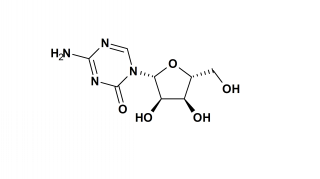MONTREAL -- MethylGene Inc. (TSX:MYG) a biopharmaceutical company, today announced that it has initiated the first of several Phase I/II clinical trials which will evaluate the combination therapy using MGCD0103 and azacitidine (Vidaza(TM), Pharmion Corporation) in patients with advanced myelodysplastic syndrome (MDS) or acute myelogenous leukemia (AML).
MGCD0103 is a rationally designed, oral, isotypic-selective, small molecule inhibitor of histone deacetylases (HDACs). HDACs are enzymes that are believed to play a role in cancer progression. Aberrant DNA methylation is also believed to play a role in cancer. Vidaza(TM), a demethylating agent, is a recently approved first-line monotherapy treatment for MDS.HDAC inhibitors, such as MGCD0103, and demethylating agents both act by turning on tumour suppressor genes that have been inappropriately turned off. Tumour suppressor genes are the body's natural defense against cancer. Preclinical studies demonstrate that MGCD0103 and demethylating agents synergistically kill cancer cells.
In the Phase I portion of the trial, MGCD0103 will be given orally, 3 times per week in combination with standard Vidaza(TM) treatment.Key objectives of this portion of the study will be to evaluate the compatibility and safety of administering these two agents together, and to determine the maximum dose of MGCD0103 that can safely be administered in this combination. Secondary objectives include determining the dose-limiting toxicities, the objective responses to MGCD0103 and Vidaza(TM), and measuring the pharmacodynamic and pharmacokinetic effects. In the Phase II portion of the trial, the purpose will be to determine the overall response rate. The trial is expected to enroll up to 50 patients at five sites at leading cancer centres in North America.
"We are pleased with our MGCD0103 Phase I results in hematological cancers and believe that using Vidaza(TM) in combination with MGCD0103 will enhance our ability to target cancers such as MDS and AML," said Dr. Robert E. Martell, Vice President and Chief Medical Officer of MethylGene. "We are working with well-known clinical investigators from major cancer centres across the U.S. to advance this novel approach."
About MDS and AML
The cause of MDS is largely unknown and there are no known cures. Current therapies focus on reducing or preventing complications of the disease. MDS is a collection of disorders in which the bone marrow does not produce enough normal blood cells and may cause symptoms such as weakness, fatigue, infections, easy bruising, bleeding and fevers. In some cases, MDS may progress to AML where leukemic dysfunctional cells replace healthy blood cells and spread to key organs such as the liver and kidneys. The decreased number of functioning blood cells in patients with AML can make patients susceptible to infections and bleeding. Over 80-90% of cases of MDS occur in individuals over 60 years of age and of these 10-50% can progress to AML. Eventually 70 to 75% of patients with MDS succumb to either complications or progression to AML.
Statistics from the American Cancer Society for 2005, show that between 10,000-15,000 new cases of MDS occur each year in the United States and this number appears to be increasing. This may be because of the aging population and the increasing number of cancer survivors who have received chemotherapy.
About MethylGene
MethylGene is a publicly traded biopharmaceutical company focused on the discovery, development and commercialization of novel therapeutics in cancer and infectious disease. Two cancer product candidates are currently in clinical trials: MGCD0103, partnered with Taiho Pharmaceutical for certain Asian countries, and MG98, partnered with MGI Pharma for North America.
MGCD0103 is currently in Phase I dose-escalation monotherapy trials against solid tumours and hematological malignancies. MG98 has entered a randomized two-step Phase II combination trial with interferon alpha in metastatic renal cell cancer. MethylGene has an exclusive license agreement with Merck & Co. for the development and commercialization of small molecule beta-lactamase inhibitors to overcome antibiotic resistance. MethylGene has a portfolio of preclinical programs for its multi-targeted kinase and histone deacetylase (HDAC) inhibitors for both oncology and non-oncology indications, and continues to seek partnering opportunities in these areas. Please visit MethylGene's website at www.methylgene.com.
Except for historical information, this news release may contain forward-looking statements, which reflect the Company's current expectation regarding future events. These forward-looking statements involve risk and uncertainties,(which can be found in the Company's Annual Information Form dated December 31, 2004, and can be found on www.sedar.com) which may cause but are not limited to, changing market conditions, the successful and timely completion of clinical studies, the establishment of corporate alliances, the impact of competitive products and pricing, new product development, uncertainties related to the regulatory approval process and other risks detailed from time to time in the Company's ongoing quarterly and annual reporting.
COPYRIGHT 2005 Business Wire
COPYRIGHT 2005 Gale Group



